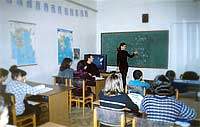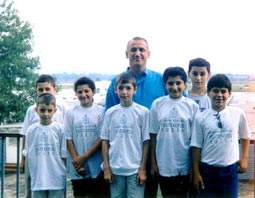|
Education.
|
|
 In this photograph of 1929 you can see participants in a program for teachers of the Greek language.
In this photograph of 1929 you can see participants in a program for teachers of the Greek language.
On the wall, written: “The 5th central seminar for Greek teachers. Ready for realization of the five year plan” in the Soviet version of the Greek language. In those years an effort was made in Soviet Russia to reform the Greek language into “a new” one.
|
|
|
|
|
|
|
|
|
|
|
|
|

|
|
|
|
 Until the late 30s in the area of Stavropol and also in Pyatigorsk there used to be Greek schools, where the citizens of Greek origin in the Soviet Union were able to learn their language and cultivate
the Greek civilization. After
the closing of national schools some Greek generations from the Stavropol area didn't have the chance to learn the Greek language and the disconnection of the people from their cultural inheritage took place.
Until the late 30s in the area of Stavropol and also in Pyatigorsk there used to be Greek schools, where the citizens of Greek origin in the Soviet Union were able to learn their language and cultivate
the Greek civilization. After
the closing of national schools some Greek generations from the Stavropol area didn't have the chance to learn the Greek language and the disconnection of the people from their cultural inheritage took place.
|
 |
 |
 |
 |

We learn the Greek language |
 |
 |
 |
 |
|
|
 After the change of the cultural direction in our country, the Greeks born in Russia could come into contact with their historical motherland easier and at that time the reed for learning the Greek language appeared again. With the opening of the Greek community in Pyatigorsk, the first years there were a lot of problems. In order to have lessons we rented classrooms. We had no books and the students used photocopies made by a professor, called Zimov Dimitrios. Mr. Zimov and some other local Greeks came into contact with the Greek language for the first time by taking lessons from Cyprian students who were studying at the linguistic University of Pyatigorsk at that time. Later on Mr. Zimov became a real specialist in Greek, in the Stavropol region. He is also a member of the administrative council of the international section of the Greek Community. All the teachers of Greek working today for our Community studied with Mr. Zimov.
After the change of the cultural direction in our country, the Greeks born in Russia could come into contact with their historical motherland easier and at that time the reed for learning the Greek language appeared again. With the opening of the Greek community in Pyatigorsk, the first years there were a lot of problems. In order to have lessons we rented classrooms. We had no books and the students used photocopies made by a professor, called Zimov Dimitrios. Mr. Zimov and some other local Greeks came into contact with the Greek language for the first time by taking lessons from Cyprian students who were studying at the linguistic University of Pyatigorsk at that time. Later on Mr. Zimov became a real specialist in Greek, in the Stavropol region. He is also a member of the administrative council of the international section of the Greek Community. All the teachers of Greek working today for our Community studied with Mr. Zimov.
|
 Since 1996 at the Greek Community of Pyatigorsk evening classes have been organized and are still running today-lessons take place twice a week and each lesson lasts 1,5 hour. Pupils learn the Greek language and of course come into contact with the civilization. During the national celebrations performances were given many times. For four years under the aegis of the General Secretariat for Greeks Abroad the best students were invited to summer camps in
Greece. There, the children are offered the opportunity to put the knowledge they have acquired during the academic year into use, furthermore they get familiar with the Greek civilization in their historical motherland.
Since 1996 at the Greek Community of Pyatigorsk evening classes have been organized and are still running today-lessons take place twice a week and each lesson lasts 1,5 hour. Pupils learn the Greek language and of course come into contact with the civilization. During the national celebrations performances were given many times. For four years under the aegis of the General Secretariat for Greeks Abroad the best students were invited to summer camps in
Greece. There, the children are offered the opportunity to put the knowledge they have acquired during the academic year into use, furthermore they get familiar with the Greek civilization in their historical motherland.
|
|
|
 |
 |
 |
 |

 Visitors to Greece, invited by
Visitors to Greece, invited by
the General Secretariat
for Greeks Abroad, are taking a rest.
|
 |
 |
 |
 |
|
|
 Great attention is paid to the further education of the Greek language teachers. Educational seminars with the participation of professors from the universities of Greece are frequently organized: in Stavropol (in 1997), in Sotchi (in 1998), in Pyatigorsk (in 1999), in Crete at the University of Rethymno (summer 1999). Several teachers have attended intercultural educational programs and those of the Greek as a second or foreign language for one up to eight months at the universities of Patra and Athens. Yet many problems exist. The good books are not enough, the ones we have are old.
There is a need for books especially orientated to the children of Russia. The teacher of our community, Matveieva Alexandra, has participated at the writing of one of these books, that is currently being prepared in the university of Crete. We should mention at this point that the Greek Community uses all the possibilities offered by the Greek side on the matter of education and up today our community has sent the most teachers to educational programs in Greece.
Great attention is paid to the further education of the Greek language teachers. Educational seminars with the participation of professors from the universities of Greece are frequently organized: in Stavropol (in 1997), in Sotchi (in 1998), in Pyatigorsk (in 1999), in Crete at the University of Rethymno (summer 1999). Several teachers have attended intercultural educational programs and those of the Greek as a second or foreign language for one up to eight months at the universities of Patra and Athens. Yet many problems exist. The good books are not enough, the ones we have are old.
There is a need for books especially orientated to the children of Russia. The teacher of our community, Matveieva Alexandra, has participated at the writing of one of these books, that is currently being prepared in the university of Crete. We should mention at this point that the Greek Community uses all the possibilities offered by the Greek side on the matter of education and up today our community has sent the most teachers to educational programs in Greece.
|
|
|
|
 In 1999 at the State Linguistic University of Pyatigorsk a Greek department, belonging to the German School was founded for those who would like to read the two languages in depth. Before that, the Greek language was being taught at the Institute of complementary professions at the university mentioned above twice a week.
In 1999 at the State Linguistic University of Pyatigorsk a Greek department, belonging to the German School was founded for those who would like to read the two languages in depth. Before that, the Greek language was being taught at the Institute of complementary professions at the university mentioned above twice a week.
|
 In order to have promotion of the Greek education, some steps should be taken. Educators from Greece, mainly philologists, should be detached, more seminars for the self-taught teachers should be organized, the teachers should get higher salary than the one the Greek communities can afford, textbooks should be sent to schools and finally festivals and all sorts of cultural activities able to promote the image and status of contemporary Greece should be accomplished in order to strengthen the ties between Greece and Russia.
In order to have promotion of the Greek education, some steps should be taken. Educators from Greece, mainly philologists, should be detached, more seminars for the self-taught teachers should be organized, the teachers should get higher salary than the one the Greek communities can afford, textbooks should be sent to schools and finally festivals and all sorts of cultural activities able to promote the image and status of contemporary Greece should be accomplished in order to strengthen the ties between Greece and Russia.
|
|
|
|
|
|
|
|
|
